- Home
- Daniel Defoe
The Further Adventures of Robinson Crusoe Page 3
The Further Adventures of Robinson Crusoe Read online
Page 3
themselves in the extravagances of their passions; for if an excess
of joy can carry men out to such a length beyond the reach of their
reason, what will not the extravagances of anger, rage, and a
provoked mind carry us to? And, indeed, here I saw reason for
keeping an exceeding watch over our passions of every kind, as well
those of joy and satisfaction as those of sorrow and anger.
We were somewhat disordered by these extravagances among our new
guests for the first day; but after they had retired to lodgings
provided for them as well as our ship would allow, and had slept
heartily--as most of them did, being fatigued and frightened--they
were quite another sort of people the next day. Nothing of good
manners, or civil acknowledgments for the kindness shown them, was
wanting; the French, it is known, are naturally apt enough to
exceed that way. The captain and one of the priests came to me the
next day, and desired to speak with me and my nephew; the commander
began to consult with us what should be done with them; and first,
they told us we had saved their lives, so all they had was little
enough for a return to us for that kindness received. The captain
said they had saved some money and some things of value in their
boats, caught hastily out of the flames, and if we would accept it
they were ordered to make an offer of it all to us; they only
desired to be set on shore somewhere in our way, where, if
possible, they might get a passage to France. My nephew wished to
accept their money at first word, and to consider what to do with
them afterwards; but I overruled him in that part, for I knew what
it was to be set on shore in a strange country; and if the
Portuguese captain that took me up at sea had served me so, and
taken all I had for my deliverance, I must have been starved, or
have been as much a slave at the Brazils as I had been at Barbary,
the mere being sold to a Mahometan excepted; and perhaps a
Portuguese is not a much better master than a Turk, if not in some
cases much worse.
I therefore told the French captain that we had taken them up in
their distress, it was true, but that it was our duty to do so, as
we were fellow-creatures; and we would desire to be so delivered if
we were in the like or any other extremity; that we had done
nothing for them but what we believed they would have done for us
if we had been in their case and they in ours; but that we took
them up to save them, not to plunder them; and it would be a most
barbarous thing to take that little from them which they had saved
out of the fire, and then set them on shore and leave them; that
this would be first to save them from death, and then kill them
ourselves: save them from drowning, and abandon them to starving;
and therefore I would not let the least thing be taken from them.
As to setting them on shore, I told them indeed that was an
exceeding difficulty to us, for that the ship was bound to the East
Indies; and though we were driven out of our course to the westward
a very great way, and perhaps were directed by Heaven on purpose
for their deliverance, yet it was impossible for us wilfully to
change our voyage on their particular account; nor could my nephew,
the captain, answer it to the freighters, with whom he was under
charter to pursue his voyage by way of Brazil; and all I knew we
could do for them was to put ourselves in the way of meeting with
other ships homeward bound from the West Indies, and get them a
passage, if possible, to England or France.
The first part of the proposal was so generous and kind they could
not but be very thankful for it; but they were in very great
consternation, especially the passengers, at the notion of being
carried away to the East Indies; they then entreated me that as I
was driven so far to the westward before I met with them, I would
at least keep on the same course to the banks of Newfoundland,
where it was probable I might meet with some ship or sloop that
they might hire to carry them back to Canada.
I thought this was but a reasonable request on their part, and
therefore I inclined to agree to it; for indeed I considered that
to carry this whole company to the East Indies would not only be an
intolerable severity upon the poor people, but would be ruining our
whole voyage by devouring all our provisions; so I thought it no
breach of charter-party, but what an unforeseen accident made
absolutely necessary to us, and in which no one could say we were
to blame; for the laws of God and nature would have forbid that we
should refuse to take up two boats full of people in such a
distressed condition; and the nature of the thing, as well
respecting ourselves as the poor people, obliged us to set them on
shore somewhere or other for their deliverance. So I consented
that we would carry them to Newfoundland, if wind and weather would
permit: and if not, I would carry them to Martinico, in the West
Indies.
The wind continued fresh easterly, but the weather pretty good; and
as the winds had continued in the points between NE. and SE. a long
time, we missed several opportunities of sending them to France;
for we met several ships bound to Europe, whereof two were French,
from St. Christopher's, but they had been so long beating up
against the wind that they durst take in no passengers, for fear of
wanting provisions for the voyage, as well for themselves as for
those they should take in; so we were obliged to go on. It was
about a week after this that we made the banks of Newfoundland;
where, to shorten my story, we put all our French people on board a
bark, which they hired at sea there, to put them on shore, and
afterwards to carry them to France, if they could get provisions to
victual themselves with. When I say all the French went on shore,
I should remember that the young priest I spoke of, hearing we were
bound to the East Indies, desired to go the voyage with us, and to
be set on shore on the coast of Coromandel; which I readily agreed
to, for I wonderfully liked the man, and had very good reason, as
will appear afterwards; also four of the seamen entered themselves
on our ship, and proved very useful fellows.
From hence we directed our course for the West Indies, steering
away S. and S. by E. for about twenty days together, sometimes
little or no wind at all; when we met with another subject for our
humanity to work upon, almost as deplorable as that before.
CHAPTER II-- INTERVENING HISTORY OF COLONY
It was in the latitude of 27 degrees 5 minutes N., on the 19th day
of March 1694-95, when we spied a sail, our course SE. and by S.
We soon perceived it was a large vessel, and that she bore up to
us, but could not at first know what to make of her, till, after
coming a little nearer, we found she had lost her main-topmast,
fore-mast, and bowsprit; and presently she fired a gun as a signal
of distress. The weather was pretty good, wind at NNW. a fresh
gale, an
d we soon came to speak with her. We found her a ship of
Bristol, bound home from Barbadoes, but had been blown out of the
road at Barbadoes a few days before she was ready to sail, by a
terrible hurricane, while the captain and chief mate were both gone
on shore; so that, besides the terror of the storm, they were in an
indifferent case for good mariners to bring the ship home. They
had been already nine weeks at sea, and had met with another
terrible storm, after the hurricane was over, which had blown them
quite out of their knowledge to the westward, and in which they
lost their masts. They told us they expected to have seen the
Bahama Islands, but were then driven away again to the south-east,
by a strong gale of wind at NNW., the same that blew now: and
having no sails to work the ship with but a main course, and a kind
of square sail upon a jury fore-mast, which they had set up, they
could not lie near the wind, but were endeavouring to stand away
for the Canaries.
But that which was worst of all was, that they were almost starved
for want of provisions, besides the fatigues they had undergone;
their bread and flesh were quite gone--they had not one ounce left
in the ship, and had had none for eleven days. The only relief
they had was, their water was not all spent, and they had about
half a barrel of flour left; they had sugar enough; some succades,
or sweetmeats, they had at first, but these were all devoured; and
they had seven casks of rum. There was a youth and his mother and
a maid-servant on board, who were passengers, and thinking the ship
was ready to sail, unhappily came on board the evening before the
hurricane began; and having no provisions of their own left, they
were in a more deplorable condition than the rest: for the seamen
being reduced to such an extreme necessity themselves, had no
compassion, we may be sure, for the poor passengers; and they were,
indeed, in such a condition that their misery is very hard to
describe.
I had perhaps not known this part, if my curiosity had not led me,
the weather being fair and the wind abated, to go on board the
ship. The second mate, who upon this occasion commanded the ship,
had been on board our ship, and he told me they had three
passengers in the great cabin that were in a deplorable condition.
"Nay," says he, "I believe they are dead, for I have heard nothing
of them for above two days; and I was afraid to inquire after
them," said he, "for I had nothing to relieve them with." We
immediately applied ourselves to give them what relief we could
spare; and indeed I had so far overruled things with my nephew,
that I would have victualled them though we had gone away to
Virginia, or any other part of the coast of America, to have
supplied ourselves; but there was no necessity for that.
But now they were in a new danger; for they were afraid of eating
too much, even of that little we gave them. The mate, or
commander, brought six men with him in his boat; but these poor
wretches looked like skeletons, and were so weak that they could
hardly sit to their oars. The mate himself was very ill, and half
starved; for he declared he had reserved nothing from the men, and
went share and share alike with them in every bit they ate. I
cautioned him to eat sparingly, and set meat before him
immediately, but he had not eaten three mouthfuls before he began
to be sick and out of order; so he stopped a while, and our surgeon
mixed him up something with some broth, which he said would be to
him both food and physic; and after he had taken it he grew better.
In the meantime I forgot not the men. I ordered victuals to be
given them, and the poor creatures rather devoured than ate it:
they were so exceedingly hungry that they were in a manner
ravenous, and had no command of themselves; and two of them ate
with so much greediness that they were in danger of their lives the
next morning. The sight of these people's distress was very moving
to me, and brought to mind what I had a terrible prospect of at my
first coming on shore in my island, where I had not the least
mouthful of food, or any prospect of procuring any; besides the
hourly apprehensions I had of being made the food of other
creatures. But all the while the mate was thus relating to me the
miserable condition of the ship's company, I could not put out of
my thought the story he had told me of the three poor creatures in
the great cabin, viz. the mother, her son, and the maid-servant,
whom he had heard nothing of for two or three days, and whom, he
seemed to confess, they had wholly neglected, their own extremities
being so great; by which I understood that they had really given
them no food at all, and that therefore they must be perished, and
be all lying dead, perhaps, on the floor or deck of the cabin.
As I therefore kept the mate, whom we then called captain, on board
with his men, to refresh them, so I also forgot not the starving
crew that were left on board, but ordered my own boat to go on
board the ship, and, with my mate and twelve men, to carry them a
sack of bread, and four or five pieces of beef to boil. Our
surgeon charged the men to cause the meat to be boiled while they
stayed, and to keep guard in the cook-room, to prevent the men
taking it to eat raw, or taking it out of the pot before it was
well boiled, and then to give every man but a very little at a
time: and by this caution he preserved the men, who would
otherwise have killed themselves with that very food that was given
them on purpose to save their lives.
At the same time I ordered the mate to go into the great cabin, and
see what condition the poor passengers were in; and if they were
alive, to comfort them, and give them what refreshment was proper:
and the surgeon gave him a large pitcher, with some of the prepared
broth which he had given the mate that was on board, and which he
did not question would restore them gradually. I was not satisfied
with this; but, as I said above, having a great mind to see the
scene of misery which I knew the ship itself would present me with,
in a more lively manner than I could have it by report, I took the
captain of the ship, as we now called him, with me, and went
myself, a little after, in their boat.
I found the poor men on board almost in a tumult to get the
victuals out of the boiler before it was ready; but my mate
observed his orders, and kept a good guard at the cook-room door,
and the man he placed there, after using all possible persuasion to
have patience, kept them off by force; however, he caused some
biscuit-cakes to be dipped in the pot, and softened with the liquor
of the meat, which they called brewis, and gave them every one some
to stay their stomachs, and told them it was for their own safety
that he was obliged to give them but little at a time. But it was
all in vain; and had I not come on board, and their own commander
and officers with m
e, and with good words, and some threats also of
giving them no more, I believe they would have broken into the
cook-room by force, and torn the meat out of the furnace--for words
are indeed of very small force to a hungry belly; however, we
pacified them, and fed them gradually and cautiously at first, and
the next time gave them more, and at last filled their bellies, and
the men did well enough.
But the misery of the poor passengers in the cabin was of another
nature, and far beyond the rest; for as, first, the ship's company
had so little for themselves, it was but too true that they had at
first kept them very low, and at last totally neglected them: so
that for six or seven days it might be said they had really no food
at all, and for several days before very little. The poor mother,
who, as the men reported, was a woman of sense and good breeding,
had spared all she could so affectionately for her son, that at
last she entirely sank under it; and when the mate of our ship went
in, she sat upon the floor on deck, with her back up against the
sides, between two chairs, which were lashed fast, and her head
sunk between her shoulders like a corpse, though not quite dead.
My mate said all he could to revive and encourage her, and with a
spoon put some broth into her mouth. She opened her lips, and
lifted up one hand, but could not speak: yet she understood what
he said, and made signs to him, intimating, that it was too late
for her, but pointed to her child, as if she would have said they
should take care of him. However, the mate, who was exceedingly
moved at the sight, endeavoured to get some of the broth into her
mouth, and, as he said, got two or three spoonfuls down--though I
question whether he could be sure of it or not; but it was too
late, and she died the same night.
The youth, who was preserved at the price of his most affectionate
mother's life, was not so far gone; yet he lay in a cabin bed, as
one stretched out, with hardly any life left in him. He had a
piece of an old glove in his mouth, having eaten up the rest of it;
however, being young, and having more strength than his mother, the
mate got something down his throat, and he began sensibly to
revive; though by giving him, some time after, but two or three
spoonfuls extraordinary, he was very sick, and brought it up again.
But the next care was the poor maid: she lay all along upon the
deck, hard by her mistress, and just like one that had fallen down
in a fit of apoplexy, and struggled for life. Her limbs were
distorted; one of her hands was clasped round the frame of the
chair, and she gripped it so hard that we could not easily make her
let it go; her other arm lay over her head, and her feet lay both
together, set fast against the frame of the cabin table: in short,
she lay just like one in the agonies of death, and yet she was
alive too. The poor creature was not only starved with hunger, and
terrified with the thoughts of death, but, as the men told us
afterwards, was broken-hearted for her mistress, whom she saw dying
for two or three days before, and whom she loved most tenderly. We
knew not what to do with this poor girl; for when our surgeon, who
was a man of very great knowledge and experience, had, with great
application, recovered her as to life, he had her upon his hands
still; for she was little less than distracted for a considerable
time after.
Whoever shall read these memorandums must be desired to consider
that visits at sea are not like a journey into the country, where
sometimes people stay a week or a fortnight at a place. Our
business was to relieve this distressed ship's crew, but not lie by
for them; and though they were willing to steer the same course
with us for some days, yet we could carry no sail to keep pace with
a ship that had no masts. However, as their captain begged of us
to help him to set up a main-topmast, and a kind of a topmast to
his jury fore-mast, we did, as it were, lie by him for three or

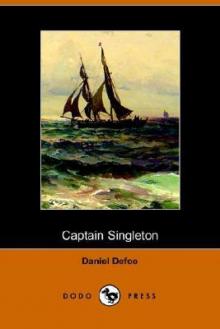 Captain Singleton
Captain Singleton An Essay Upon Projects
An Essay Upon Projects Moll Flanders Moll Flanders Moll Flanders
Moll Flanders Moll Flanders Moll Flanders The Further Adventures of Robinson Crusoe
The Further Adventures of Robinson Crusoe Everybody's Business Is Nobody's Business
Everybody's Business Is Nobody's Business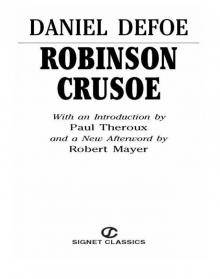 Robinson Crusoe
Robinson Crusoe The Storm
The Storm The King of Pirates
The King of Pirates History of the Plague in London
History of the Plague in London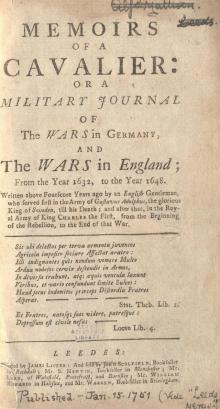 Memoirs of a Cavalier
Memoirs of a Cavalier_preview.jpg) The Life and Most Surprising Adventures of Robinson Crusoe, of York, Mariner (1801)
The Life and Most Surprising Adventures of Robinson Crusoe, of York, Mariner (1801)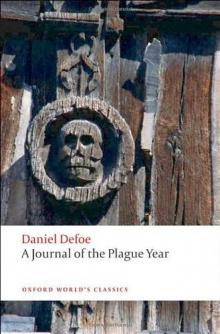 A Journal of the Plague Year
A Journal of the Plague Year_preview.jpg) The Life and Adventures of Robinson Crusoe (1808)
The Life and Adventures of Robinson Crusoe (1808)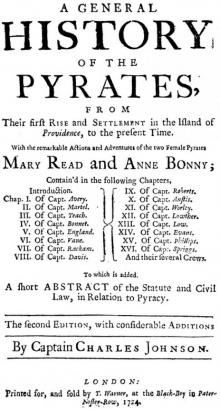 A General History of the Pyrates: / from their first rise and settlement in the island of Providence, to the present time
A General History of the Pyrates: / from their first rise and settlement in the island of Providence, to the present time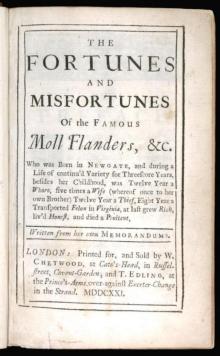 The Fortunes and Misfortunes of the Famous Moll Flanders
The Fortunes and Misfortunes of the Famous Moll Flanders_preview.jpg) The Fortunate Mistress (Parts 1 and 2)
The Fortunate Mistress (Parts 1 and 2) Robinson Crusoe — in Words of One Syllable
Robinson Crusoe — in Words of One Syllable From London to Land's End
From London to Land's End A New Voyage Round the World by a Course Never Sailed Before
A New Voyage Round the World by a Course Never Sailed Before Roxana
Roxana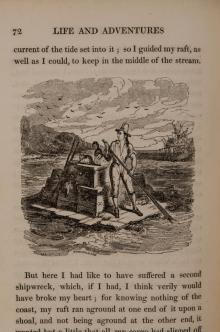 The Life and Adventures of Robinson Crusoe of York, Mariner, Volume 1
The Life and Adventures of Robinson Crusoe of York, Mariner, Volume 1_preview.jpg) Memoirs of Major Alexander Ramkins (1718)
Memoirs of Major Alexander Ramkins (1718) Dickory Cronke
Dickory Cronke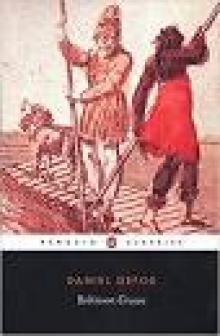 Robinson Crusoe (Penguin ed.)
Robinson Crusoe (Penguin ed.) Moll Flanders
Moll Flanders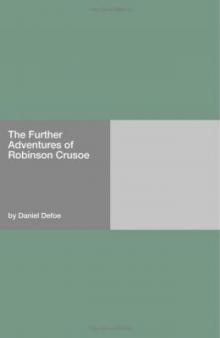 The Further Adventures of Robinson Crusoe rc-2
The Further Adventures of Robinson Crusoe rc-2